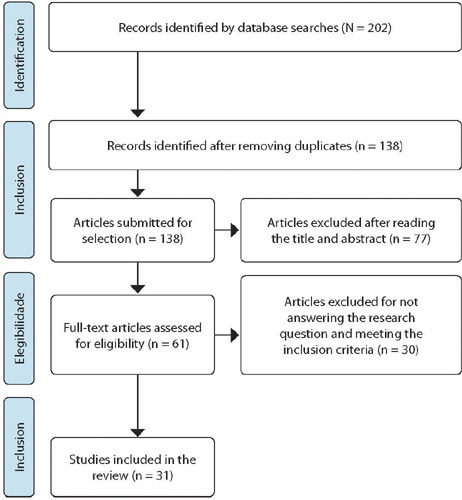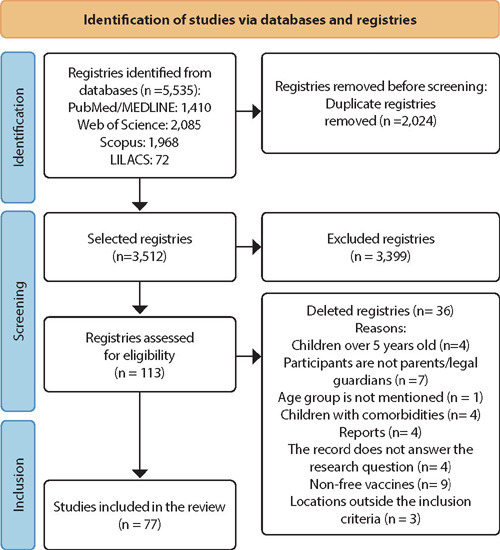-
REVIEW11-22-2024
Transition to family parenting in the face of the first child: a scoping review
Revista Brasileira de Enfermagem. 2024;77(5):e20230487
Abstract
REVIEWTransition to family parenting in the face of the first child: a scoping review
Revista Brasileira de Enfermagem. 2024;77(5):e20230487
DOI 10.1590/0034-7167-2023-0487
Views1See moreABSTRACT
Objectives:
to identify and summarize the elements that characterize the family transition process in relation to the first child.
Methods:
a scoping review was carried out based on JBI methodology, in six databases, following the Preferred Reporting Items for Systematic reviews and Meta-Analyses extension for Scoping Reviews checklist.
Results:
ten articles were included with factors characterizing the transition, such as hindering/facilitating conditions that influence the process, important support structures in adaptation and strategies/responses used in the transition process.
Final Considerations:
elements characterizing the transition process in relation to the first child were identified. However, no theoretical explanation for this was identified. Further research should be carried out to obtain a deeper understanding of this process.

-
REVIEW11-22-2024
Telenursing contributions in Primary Health Care in the COVID-19 pandemic context: an integrative review
Revista Brasileira de Enfermagem. 2024;77(5):e20240093
Abstract
REVIEWTelenursing contributions in Primary Health Care in the COVID-19 pandemic context: an integrative review
Revista Brasileira de Enfermagem. 2024;77(5):e20240093
DOI 10.1590/0034-7167-2024-0093
Views1See moreABSTRACT
Objective:
to identify telenursing contributions in Primary Health Care during the COVID-19 pandemic.
Methods:
an integrative literature review, conducted between January and August 2022 in the PubMed, CINAHL, LILACS, BDENF, Scopus, WoS, EMBASE and SciELO databases. A total of 493 studies was found, 62 were read in full, and of these, 16 were selected. For analysis, a dynamic reading of the studies and synthesis of the main results were carried out.
Results:
the main results highlighted telenursing practice as a challenge for professionals and the population. Among the contributions and positive points and aspects that require improvement, practice showed promise when considered in a post-pandemic scenario.
Final considerations:
through telenursing, the population’s access to Primary Health Care was guaranteed in the face of the COVID-19 pandemic. However, a critical look at current technological advances in healthcare is necessary.

-
REVIEW10-07-2024
Risk factors associated with the occurrence of the adverse event phlebitis in hospitalized adult patients
Revista Brasileira de Enfermagem. 2024;77(5):e20240162
Abstract
REVIEWRisk factors associated with the occurrence of the adverse event phlebitis in hospitalized adult patients
Revista Brasileira de Enfermagem. 2024;77(5):e20240162
DOI 10.1590/0034-7167-2024-0162
Views0See moreABSTRACT
Objectives:
to synthesize knowledge regarding risk factors associated with occurrence of adverse event phlebitis in hospitalized adult patients.
Methods:
an integrative literature review, carried out in the CINAHL, PubMed, Virtual Health Library, Embase, Web of Science and Scopus databases. The stages were carried out independently by two reviewers, and the data were analyzed descriptively.
Results:
from the analysis of 31 quantitative primary studies, the following risk factors were summarized: length of stay; use of antibiotics; peripheral intravenous catheter dwell time; receive less nursing care; catheter inserted multiple times; patients with infection and comorbidities; presence of pain at catheter insertion site; Teflon® catheter use; reduced patient mobility; quality of patient’s vein; skin elasticity; unsuccessful insertion.
Conclusions:
it is necessary to standardize the format for measuring occurrence of this adverse event and develop new studies with a higher level of evidence.

-
REVIEW09-20-2024
Brazilian nursing specific situation, middle and micro-range theories: a bibliometric study
Revista Brasileira de Enfermagem. 2024;77(4):e20230520
Abstract
REVIEWBrazilian nursing specific situation, middle and micro-range theories: a bibliometric study
Revista Brasileira de Enfermagem. 2024;77(4):e20230520
DOI 10.1590/0034-7167-2023-0520
Views0See moreABSTRACT
Objectives:
to map the nursing theories developed in stricto sensu graduate programs in nursing in Brazil.
Methods:
a bibliometric study, carried out on the Coordination for the Improvement of Higher Education Personnel Theses and Dissertations Portal in October 2023. The controlled descriptors “Nursing Theory” and “Nursing Models” and the uncontrolled descriptors “Theories” and “Middle-Range Theory” were used. Selected studies were cataloged for analysis, which was conducted by the study authors, who have a doctoral degree and expertise in research on nursing theories.
Results:
thirty-nine nursing theories were mapped, with a predominance of middle-range theories (79.5%), focusing on nursing diagnostic concepts and use of the theoretical-methodology strategy of theoretical-causal validity.
Conclusions:
the study identified nursing theories developed in Brazil, recognizing trends, development strategies, theorized objects of disciplinary interest and investments necessary for practical application in Brazilian contexts.

-
REVIEW09-06-2024
Nursing students’ mindfulness and emotional regulation: an integrative review
Revista Brasileira de Enfermagem. 2024;77(4):e20230466
Abstract
REVIEWNursing students’ mindfulness and emotional regulation: an integrative review
Revista Brasileira de Enfermagem. 2024;77(4):e20230466
DOI 10.1590/0034-7167-2023-0466
Views0See moreABSTRACT
Objective:
to identify the scientific evidence available in national and international literature on the relationships between nursing students’ mindfulness and emotional regulation.
Methods:
an integrative literature review, in four databases, with a time frame from January 2002 to December 2022. Articles in English, Spanish and Portuguese available in full were included.
Results:
the sample consisted of six original articles, predominantly with a quantitative approach, with cross-sectional designs standing out.
Conclusion:
the synthesis of scientific production revealed that there is a lack of research at national and international level on the subject with experimental and qualitative designs that enable conclusions about cause and effect and/or take into account subjective experiences of the applicability of mindfulness-based practice in nursing students’ emotional regulation.

-
REVIEW09-06-2024
Parents’ or legal guardians’ beliefs and attitudes about childhood vaccination: a scoping review
Revista Brasileira de Enfermagem. 2024;77(4):e20240126
Abstract
REVIEWParents’ or legal guardians’ beliefs and attitudes about childhood vaccination: a scoping review
Revista Brasileira de Enfermagem. 2024;77(4):e20240126
DOI 10.1590/0034-7167-2024-0126
Views0See moreABSTRACT
Objective:
to map scientific evidence about perceptions, beliefs, knowledge and attitudes of parents or legal guardians of children under 5 years of age regarding routine childhood vaccination.
Methods:
a scoping review, conducted in accordance with the JBI framework. The searches were carried out in the PubMed/MEDLINE, Web of Science, Scopus and LILACS databases. A total of 5,535 studies were returned and 77 were selected, which met the inclusion criteria.
Results:
perceptions related to interaction with healthcare professionals and services, with family organization and structure, with social interaction and public policies, cultural, religious and personal beliefs, knowledge about vaccination schedule, vaccination and immunization process and sources of information are the main factors mapped and which can positively or negatively influence parents’ or legal guardians’ attitudes towards vaccinating children.
Conclusions:
the findings allow us to identify factors related to parents’ perception and beliefs about childhood vaccination.

-
REVIEW08-30-2024
Educational actions conducted during the pandemic with primary health care professionals: a scoping review
Revista Brasileira de Enfermagem. 2024;77:e20230352
Abstract
REVIEWEducational actions conducted during the pandemic with primary health care professionals: a scoping review
Revista Brasileira de Enfermagem. 2024;77:e20230352
DOI 10.1590/0034-7167-2023-0352
Views0See moreABSTRACT
Objectives:
to map the educational actions conducted with primary health care professionals during the COVID-19 pandemic.
Methods:
a scoping review conducted in August 2023, which covered databases such as CINAHL, Medline, LILACS, IBECS, BDENF, and Web of Science. In total, 32 publications were analyzed through content analysis.
Results:
the primary beneficiaries of the educational actions included 69% physicians, 56% nurses, 25% pharmacists, 13% social workers and dentists, 9% psychologists, community health agents, and laboratory professionals, and 6% nursing technicians, nutritionists, and physical educators. The predominant educational interventions were training sessions (mentioned in 19 publications), followed by Continuing Health Education (10 publications) and Continuing Education (three publications).
Final Considerations:
the educational interventions demonstrated positive impacts on professional practice, particularly the Continuing Health Education actions, which were notable for stimulating critical problem-solving among professionals.

-
REVIEW08-30-2024
Impact of financial toxicity on adults with cancer during the COVID-19 pandemic: an integrative review
Revista Brasileira de Enfermagem. 2024;77:e20240078
Abstract
REVIEWImpact of financial toxicity on adults with cancer during the COVID-19 pandemic: an integrative review
Revista Brasileira de Enfermagem. 2024;77:e20240078
DOI 10.1590/0034-7167-2024-0078
Views0See moreABSTRACT
Objectives:
to identify the repercussions of financial toxicity on the lives of adult cancer patients during the COVID-19 pandemic.
Methods:
an integrative review was conducted using the PubMed, Web of Science, Scopus, and Embase databases, as well as the Virtual Health Library portal, in March 2023.
Results:
out of 62 studies found, 13 were included for analysis. The primary repercussions of financial toxicity included difficulties in covering basic expenses such as food, housing, medication, transportation, and internet access; increased anxiety and concerns related to health and financial situations; reduction or absence of income; challenges in obtaining treatment or accessing healthcare services; rising expenses; and telemedicine as a less burdensome alternative.
Conclusions:
the pandemic has exacerbated financial toxicity; therefore, healthcare teams must recognize it as an adverse event of oncological treatment and understand its potential to affect various aspects of patients’ lives.




